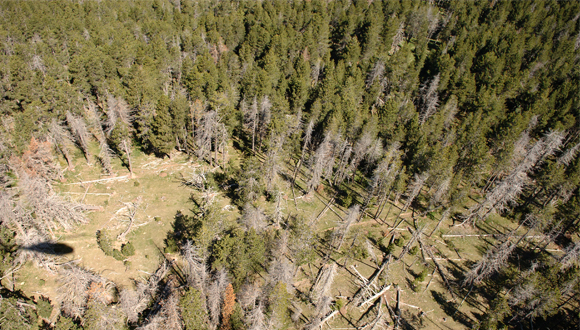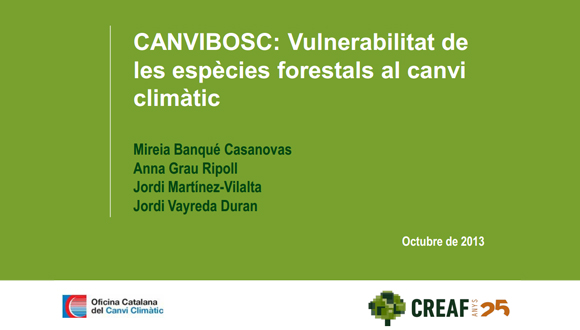CANVIBOSC discloses scientific evidence of the effects of climate change on Catalan forests
This is an unpublished study, prepared by the CREAF and promoted by the Catalan Office for Climate Change. According to CANVIBOSC, beech and Scots pine will be the species that suffer the impacts of climate change the most, while the oak and Aleppo pine are less vulnerable.

The Secretary for the Environment and Sustainability, Josep Enric Llebot, presented today, along with the head of the Catalan Office for Climate Change (OCCC), Salvador Samitier, and the director of CREAF, Javier Retana, an unpublished study in the Mediterranean that describes the current capacity of storage and carbon absorption of each of the main forest species and how they are affecting climate change. The work analyzes the vulnerability of different species to drought, fire and pests, the main factors that can alter Mediterranean forests in a context of climate change. It concluded with a ranking with the most vulnerable to fires and the drought.
According to the most recent scientific information synthesized in CANVIBOSC, beech and Scots pine forests, which currently receive more than 25% of the total carbon dioxide absorbed by Catalan forests, are particularly vulnerable to drought and fire and will very likely find it hard to survive in a drier future. The experts believe that the beech will suffer most seriously the effects of drought because it does not have good strategies to withstand a lack of water. In fact, scientists warn that, with severe climate change in the future, only 2.2% of Catalan territory will have appropriate environmental conditions for the beech. In the case of Scots pine, fire would be their greatest threat since, like the beech, it is not able to regenerate in areas burned and its seeds die after a fire.
According to CANVIBOSC, beech and Scots pine will be the species that will suffer the impacts of climate change the most, while holm oaks and Aleppo pine will be less vulnerable.
On the other hand, holm oaks and Aleppo pine, the two most abundant species in Catalonia, which currently represent 37% of the total amount of carbon absorbed by our forests, are quite resistant to fire and drought and could withstand more extreme future conditions, so their range could increase in the future.
CANVIBOSC is the result of a literature review of more than 500 scientific articles
The report is the result of a literature review of more than 500 scientific articles published in the last two decades on this issue. This study has also allowed for the identification of information gaps, and pests are an example. "Scientific publications documenting the reality of climate change and the effects that this is causing to forests are uncountable," said Mireia Banqué of the CREAF. "Collect, digest and translate all this information into a non-scientific and understandable language, while maintaining the accuracy of the original information, is essential for the result to be useful for the administration, and this has been one of the greatest challenges of this project. Products like what we are presenting will be of great value for managers and technicians who have to promote or implement preventive policies and adaptive forest management," added Gabriel Borras, of the OCCC.

Consult all the CANVIBOSC information
CANVIBOSC Presentation (in catalan):







